Cantonese crispy fried pork
Crispy fried pork is a traditional dish with color, aroma and taste. It belongs to Guangdong cuisine department. This dish is one of the classic Cantonese cured wax. The crisp-skinned roast meat is characterized by its fleshy, fragrant and crisp taste. It is called Yiju. A piece of meat can taste three kinds of taste. First, it will feel the crispness of skin, secondly, it will feel the softness of fat, and finally, it will feel the sweetness of lean meat.
One piece of pork (about 300 grams), 10 grams of salt, 10 grams of spiced powder, 10 ml of soy sauce, 8 grams of sugar, 5 grams of baking soda, 1 onion, 3 pieces of ginger, 3-4 bamboo sticks and one tin paper.
1. Wash the pork and cook it in a cool water pan. Add onions and ginger and cook it slowly until the meat discolors. Put chopsticks together without spilling blood and water. The meat is about 7 years old.
2. When the meat is cooked, remove the cold water immediately. After a little cooling, use the towel to dry the water.
3. Put some holes in the skin with bamboo sticks, the finer the hole is, the better. Then scrape the white film and impurities on the skin with a knife.
4, sprinkle a small amount of salt on the skin (about 3 grams) and apply baking soda.
5. Turn the pork over, cut a few knives at the side of lean meat to taste evenly. Then pour the remaining salt, sugar, spices and soy sauce into a bowl. The lean meat portion is salted down in the seasoning for 1-2 hours.
6. Remove the cured pork, drain the excess juice, cross-string it with bamboo sticks to prevent deformation, and then wrap the meat around tightly with tin paper, leaving only the skin exposed outside.
7. Keep the oven's heat at 250 degrees (or the highest temperature) for about 30 minutes, or remove the black coke from the skin until it starts to turn yellow and coke. Scrape the black coke with a knife.
8. Spread a layer of edible oil on the scraped meat skin surface and continue to put it in the oven. Bake it for 10 minutes with 200 degrees of fire, or see the oil on the meat skin surface.
9. Finally, slice the roast meat after slightly cooling. The skin can be eaten with sugar, and the lean meat can be eaten with soy sauce.

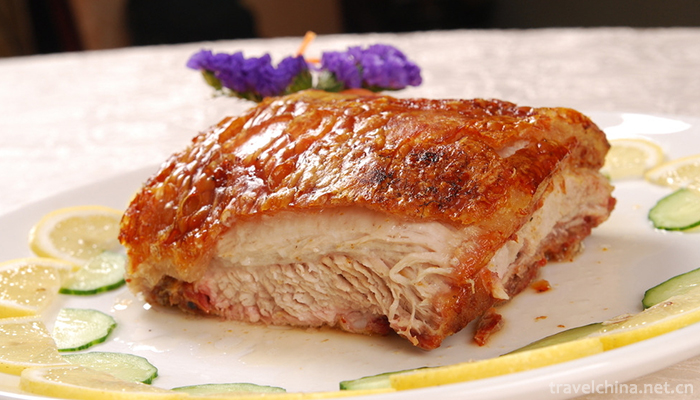
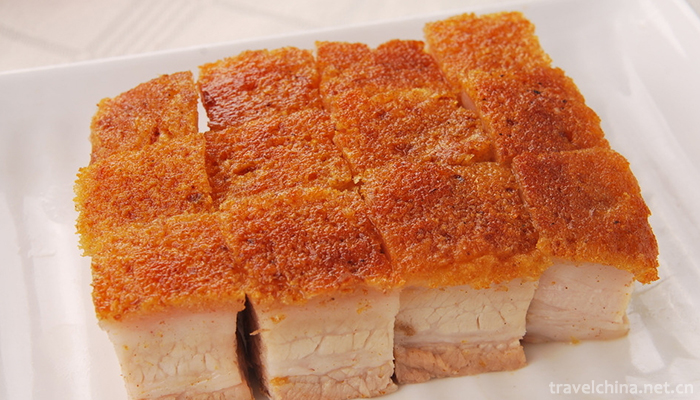
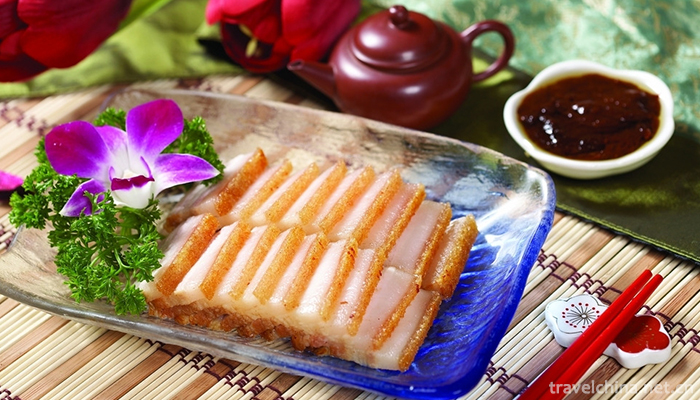
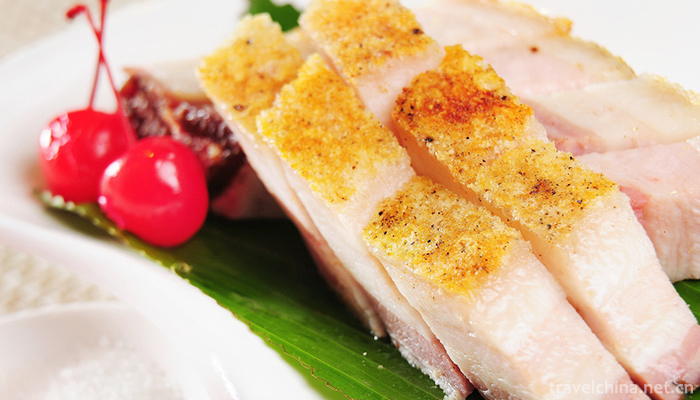
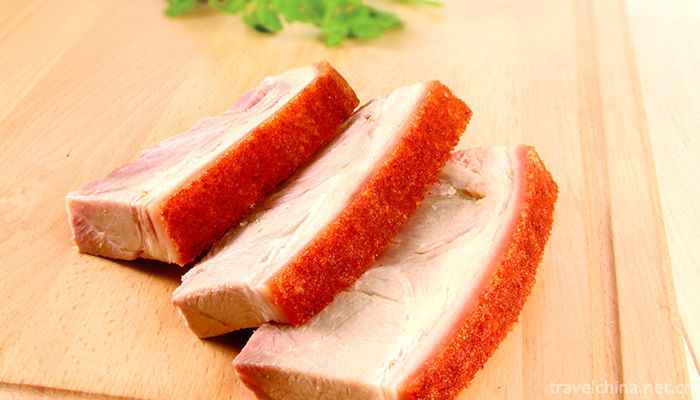
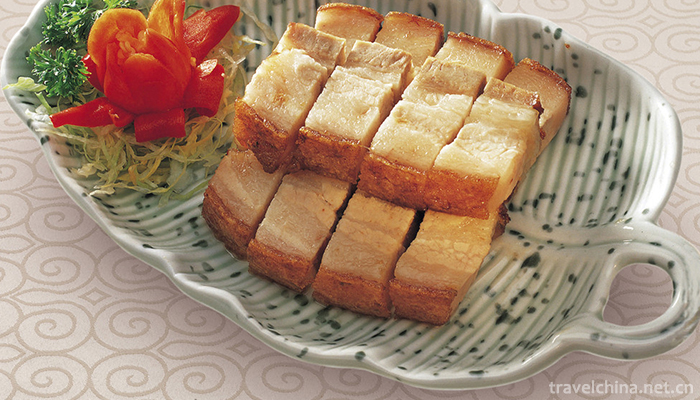
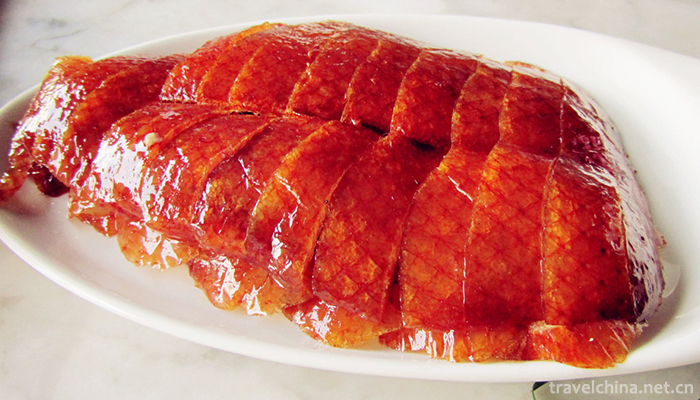
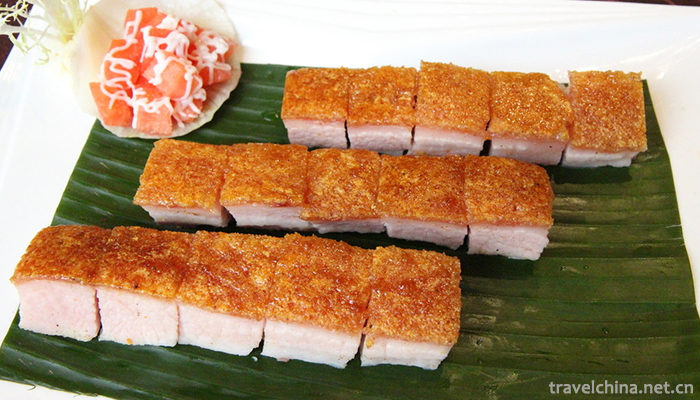
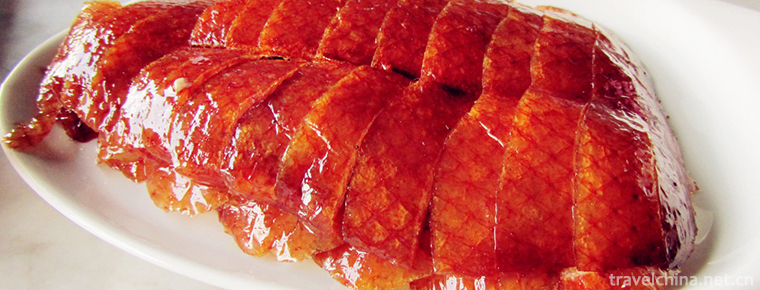
-
1.Shennongjia Forestry DistrictHubei Shennongjia
Shennongjia Forest District, referred to as Shennongjia for short, was established in 1970 with the approval of the State Council and directly under the jurisdiction of Hubei Province.
Time 2018-10-28 -
2.Wuxi film and television base
The Wuxi Film and Television Base of CCTV was originally built by CCTV to shoot "Tang Ming Huang", "Romance of the Three Kingdoms" and "Water Margin"
Time 2018-12-06 -
3.West Lake Scenic Spot in Hangzhou
Hangzhou West Lake Scenic Spot is located in the center of Hangzhou City, Zhejiang Province. It is divided into lakeside area, Lake Center area
Time 2018-12-07 -
4.Fujian earth building (Fujian Tulou)
Fujian Tulou is also called "Hakka Tulou" because most of it is built by Fujian Hakka people. Tulou came into being in Song and Yuan Dynasty and matured in the late Ming
Time 2018-12-08 -
5.World Park
The World Park is located in Dabaotai, Huaxiang, Fengtai District, Beijing. It is 16 kilometers from the city center and 8 kilometers from Beijing West Railway Station. It is a national 4A-level sceni
Time 2018-12-19 -
6.Jinhu Yang National Forest Park
Zepujin Lake Yang National Forest Park is located 40 kilometers southwest of Zepu County in the Gobi Depth, located in the upper edge of the Yerqiang River alluvial fan
Time 2019-01-23 -
7.The Great Wall Site of Qin Dynasty in Ningxia
The site of the Great Wall of King Zhao of Qin Dynasty was built in the twenty-fifth year of King Zhaoxiang of Qin Dynasty (272 BC). It was built to defend against the invasion of the Huns in the sout
Time 2019-02-07 -
8.Drum Dance
Dance and drum dance is a kind of folk dance of Miao nationality in China. Miao people's "encouragement" has a long history. The written records of Miao people's drumming
Time 2019-05-01 -
9.Jinghe Opera
Jinghe Opera, a local traditional drama in Lixian County, Hunan Province, is one of the national intangible cultural heritage.
Time 2019-05-08 -
10.Traditional Textile Dyeing Weaving and Embroidery Techniques of the Li Nationality
The traditional spinning, dyeing, weaving and embroidery techniques of the Li nationality, the traditional handicraft techniques of Hainan Province, are one of the national intangible cultural heritag
Time 2019-05-12 -
11.Bronze drum dance
Tonggu dance is one of the most popular and influential ancient dances among the Zhuang and Yi people in Wenshan Zhuang and Miao Autonomous Prefecture of Yunnan Province. It is distributed in Zhuang a
Time 2019-06-21 -
12.Month also
Dong people's "moon" means collective visiting, which is a social custom in Dong village. The young men and women in one village of the Dong nationality visit another village according to th
Time 2019-07-16